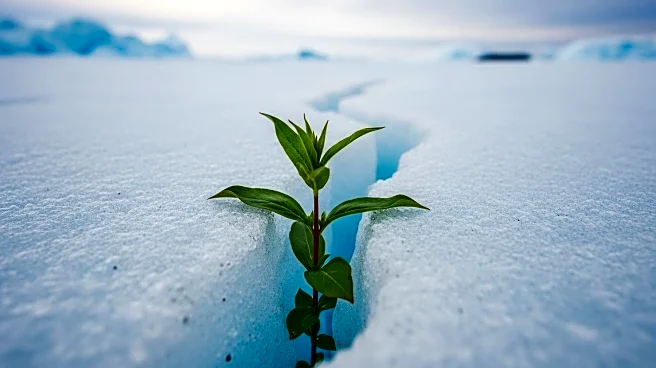What's Happening?
A team of scientists, including NPR climate correspondent Alejandra Borunda, explored Greenland's Inuit Qeqertaat, also known as Kaffeklubben Island, the northernmost landmass on Earth. The expedition aimed to document plant life at this remote location, which is increasingly accessible due to climate change. The team discovered various plant species, including Arctic poppies and mosses, indicating a shift in the region's ecological dynamics. The expedition faced challenges due to unexpectedly warm temperatures, which caused permafrost to thaw and rivers to swell, complicating travel.
Why It's Important?
The findings from this expedition highlight the impact of climate change on Arctic ecosystems. As temperatures rise, plant life is expanding in regions previously inhospitable, altering local biodiversity and potentially affecting global climate patterns. The presence of plant life at such northern latitudes suggests significant ecological shifts, which could influence carbon storage and permafrost dynamics. Understanding these changes is crucial for predicting future climate scenarios and developing strategies to mitigate environmental impacts. The research underscores the importance of continued exploration and monitoring of remote areas to assess climate change effects.
What's Next?
The expedition's findings will serve as a baseline for future studies on Arctic ecological changes. Scientists plan to return to the region to monitor plant life and assess long-term impacts of climate change. The data collected will contribute to broader climate models and inform policy decisions regarding Arctic conservation and climate mitigation efforts. As global temperatures continue to rise, researchers will focus on understanding how these changes affect not only local ecosystems but also global climate dynamics.
Beyond the Headlines
The expedition raises ethical considerations about human impact on remote ecosystems and the importance of preserving natural habitats. The presence of plant life in previously barren areas could lead to increased interest in Arctic exploration and exploitation, posing risks to fragile environments. The findings also highlight cultural dimensions, as Indigenous knowledge and perspectives play a crucial role in understanding and managing Arctic changes. Collaborative efforts between scientists and Indigenous communities are essential for sustainable and respectful exploration.









